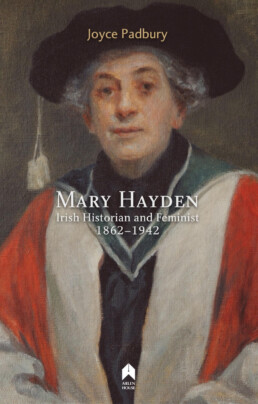
Joyce Padbury
Mary Hayden: Irish Historian and Feminist, 1862–1942
ISBN: 978-1-85132-263-3
Mary Hayden: Irish Historian and Feminist, 1862–1942 is a very significant contribution to the field of modern Irish social and political history. Joyce Padbury has filled an important gap, not only in Irish women’s history but also in terms of the development of Irish academic institutions and education history, not least of the National University of Ireland and of University College Dublin. Mary Hayden belonged to the first generation of Irish women academics and university professors, and of that generation she was to the fore. This biography encompasses the evolution of both a life and a wider society from the mid-Victorian period to the modern era in Irish history. Hayden’s interest in the Gaelic Revival and the Gaelic League led her to add fluency in modern Irish to her linguistic accomplishments, along with a close friendship with Pearse, although she disapproved of the 1916 Rising. Padbury recounts engagingly Hayden’s battles in academia. In the process, she shows how Hayden became one of the foremost feminist campaigners, along with Agnes O’Farrelly and Hanna Sheehy Skeffington. Padbury’s work is valuable and provides a persuasive account of the role and opinions of a moderate nationalist.
– Fergus D’Arcy
Mary Hayden was an exceptional figure, representative in some respects and highly individual in others. She emerges as an independent-minded and determined woman who was conscious of her own abilities and appropriately ambitious; she was impatient of the obstacles facing her in a male-dominated world. She was well-trained, well-travelled, and well-connected. For decades she played an important role in educating the elite of the Irish Free State, but she also had an exceptional concern for the underprivileged. Joyce Padbury brings out clearly how Hayden was quite remarkable in her concern with ‘unfashionable’ areas of history – in particular with the female half of the population, and with the poor and oppressed. She was a (neglected) pioneer.
Hayden was a professor for decades, a long-serving member of UCD’s Governing Body, and a member of the Senate of the National University. She was a power-broker in the university world. But perhaps even more importantly, she was a consistent (and persistent) feminist whose influence could be seen over many decades – climaxing in her opposition to de Valera’s 1937 Constitution. To take one example: she was enlightened in her attitude towards prostitution, deploring the fact that ‘fallen women’ were punished while men were applauded for ‘gallantry’. In many ways she was a ‘New Woman’, and although a nationalist for most of her career, in her hierarchy of values nationalism always took second place to the cause of equality for women.
– Michael Laffan
